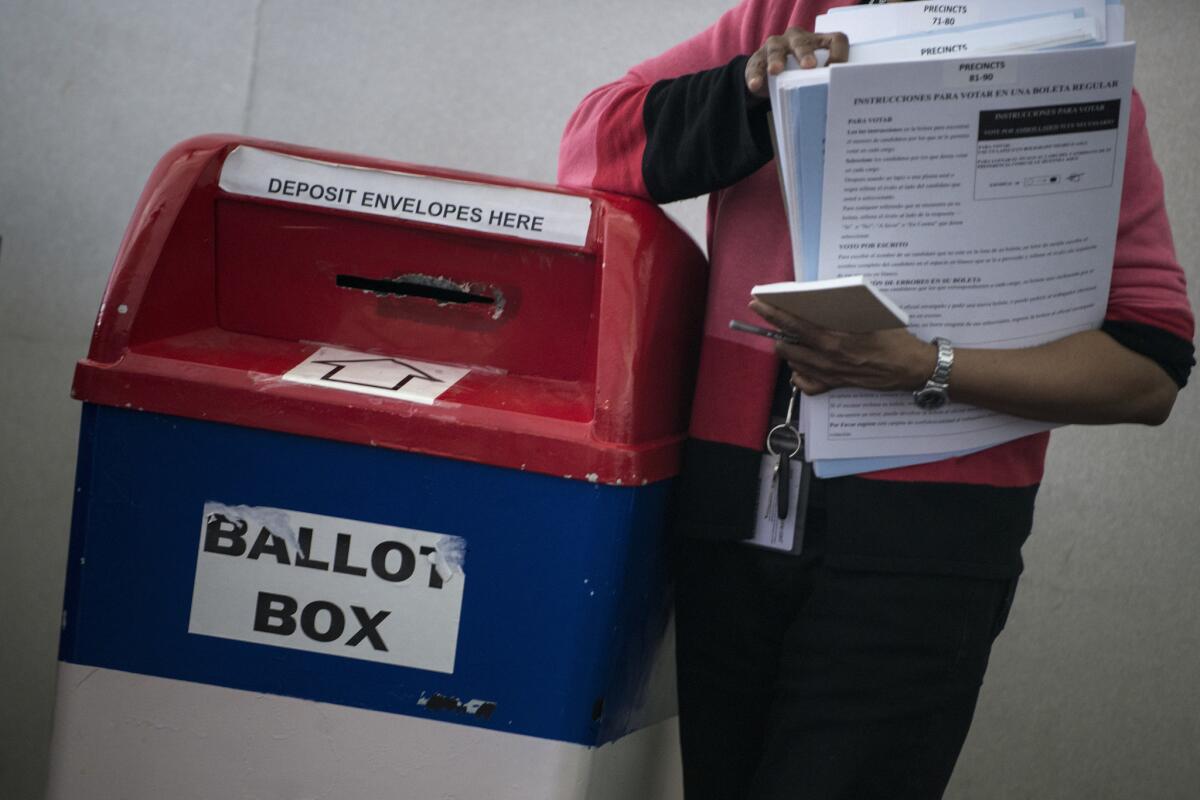Goldberg: A vote for election day

I’m writing this before Monday night’s presidential debate, on the assumption that neither candidate changed the dynamic of the race too dramatically.
But what if one did? What if Barack Obama announced in a fit of pique that “America doesn’t deserve a president as awesome as me.” Or what if Mitt Romney pulled open a panel in his chest revealing that he is, in fact, an android? And he was made in China!
Or the game-changer could be something more plausible. The point is, what if something was said or done that caused large numbers of voters to change their minds? Well, for perhaps millions of voters it would be too late, thanks to early voting.
ENDORSEMENTS: The Times’ recommendations for Nov. 6
Fifteen percent of the electorate was eligible to vote before the first presidential debate — a debate that did dramatically change the dynamic of this race. And 85% of voters were eligible to vote before Monday night’s debate. This year, it’s expected that something like 40% of ballots will be cast before election day.
Now, odds are that most of the people who voted already wouldn’t have changed their minds, no matter what happened. Early voting expert and George Mason University government professor Michael McDonald told the National Journal in late September that “the sorts of voters who are voting right now … are people who have already made up their minds.” He added, “They are hard-core partisans. Any more information you can throw at them is only going to reinforce their decision.”
This is ironic, given that the aim of most election reformers (essentially the same folks who have made early voting legal in 32 states and the District of Columbia) is to defang partisanship. That’s the supposed appeal of Australia’s “vote or pay a fine” system. If you force everyone to vote, goes the argument, you’re less likely to run a “base campaign” because you know your base will vote for you anyway.
PHOTOS: Six numbers to ignore from the presidential campaign
Early voting, on the other hand, encourages campaigns to preach to the choir. Normally, it’s Republicans who excel at this. But this year, President Obama’s taken the lead. His “war on women,” his Big Bird and “binders” rhetoric — not to mention Joe Biden’s claim to a largely black audience in August that Mitt Romney’s tax policies will put “y’all in chains” — is designed entirely to get the base to send in their ballots now. Early voting amounts to a subsidy for partisans.
I think mandatory voting is an abomination, and I don’t lose any sleep over the influence partisans have on U.S. elections. But early voting still strikes me as a terrible idea.
Everyone laments the decline in civic commitment in America. “Government is the word we use for the things we all do together,” is a common refrain from liberal reformers in particular. Well, election day used to be one of the few things we did do together as a nation. It was a hugely important civic ritual. But the cult of convenience and a knee-jerk faith that voting at home will mean higher voter “turnout” (a somewhat misleading term under the circumstances) led us to downgrade election day and replace it with “Last Chance to Vote Day.”
COMMENTARY AND ANALYSIS: Obama vs. Romney
Has the convenience yielded a “better” electorate? It doesn’t seem like it. Has early voting led to increased turnout? Only in very low turnout local elections, according to John C. Fortier, who wrote a book on early voting. Why not? Because, says Barry Burden, a University of Wisconsin political scientist who studied early voting in his state, early voting is just “a convenience for people who likely would have voted anyway.”
There are lots of reasons to have a single, solitary election day, if not on a Tuesday then perhaps a 24-hour period over a weekend. Among the best reasons: Deadlines focus the minds of voters and campaigns alike, and in-person, single-day voting cuts down on the potential for voter fraud.
But it seems to me the most important is that democracy’s legitimacy rests in no small part on the idea that the people are making a collective decision once all the campaigning is done. Having all of the voters working with the same information and letting the candidates make their case to the whole country in the same time frame seems essential to that idea.
More to Read
A cure for the common opinion
Get thought-provoking perspectives with our weekly newsletter.
You may occasionally receive promotional content from the Los Angeles Times.











